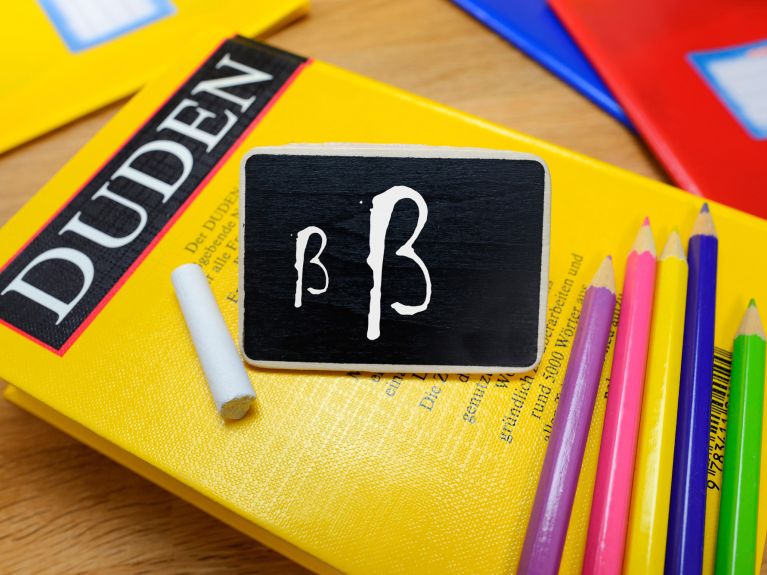How German works
Are you interested in language? Here you can find interesting answers to your questions about the German language.

In which countries in the world is German spoken?
More than 130 million people worldwide speak German as their mother tongue or second language. German is the official language in Germany, Austria, Luxembourg, Belgium, Liechtenstein and Switzerland. German is also used in the European Union as an internal working language alongside English and French. German is the most widely spoken mother tongue in the EU.
What special letters does German have?
The written language in German comprises the 26 letters of the Latin alphabet. In addition, there are the three umlauts Ä, Ö and Ü and also the Eszett (ß). The Eszett is a letter that only exists in written German. The five most frequently used letters in German are E, N, I, S and R. The five rarest letters are ß, J, X, Y and Q.
Dieses YouTube-Video kann in einem neuen Tab abgespielt werden
YouTube öffnenThird party content
We use YouTube to embed content that may collect data about your activity. Please review the details and accept the service to see this content.
Open consent formAre there any languages related to German?
German belongs to the group of West Germanic languages, a subgroup of the Germanic languages. Other West Germanic languages include English, Dutch, Yiddish and Afrikaans. In Papua New Guinea, some people speak Unserdeutsch, the only known German-based creole language. With no more than an estimated 100 native speakers, this language is considered highly endangered.
What are long compound words in German?
German is known for its long and complicated words. It is theoretically possible to form words of endless length. Word elements can be combined grammatically correctly to form so-called composites, i.e. a single word that is made up of numerous smaller ones. Here’s an example: Kaffee (coffee), Kaffeetasse (coffee cup), Kaffeetassengeschäft (coffee cup shop), Kaffeetassengeschäftseröffnung (coffee cup shop opening) and so on. Shorter words have become more established in practice, however. But there are exceptions: in 1999, the text of a draft law in the federal state of Mecklenburg-Western Pomerania contained the word Rindfleischetikettierungsüberwachungsaufgabenübertragungsgesetz (“Beef Labelling Supervision Task Transfer Act”) The longest word in the Duden dictionary is Aufmerksamkeitsdefizit-Hyperaktivitätsstörung (“attention deficit hyperactivity disorder”).
In German, a young lady has no sex, while a turnip has.
Are all nouns capitalised in the German language?
In German, nouns are capitalised. Unlike in English, this rule does not only apply to proper names – and there are no exceptions.
How many grammatical genders are there in German?
In many languages, nouns are either masculine or feminine – making them difficult enough for native speakers of English. But German has one more than this: a noun can also be neuter. The gender of a word is purely grammatical. Das Mädchen is neuter for example – even though it obviously refers to a female person.
Dieses YouTube-Video kann in einem neuen Tab abgespielt werden
YouTube öffnenThird party content
We use YouTube to embed content that may collect data about your activity. Please review the details and accept the service to see this content.
Open consent formAre there words that only exist in German?
There are certain terms that only exist in German. One example is the word fremdschämen, which means feeling a sense of shame for something somebody else did. And Fernweh is the opposite of homesickness: it describes a longing for long-distance travel and adventure. Other words such as Kindergarten have been adopted as English words, for example.




